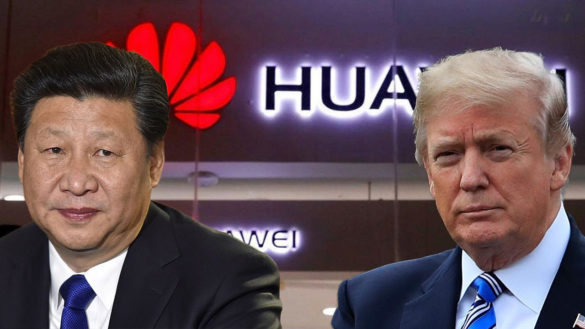
Trump’s surprise Huawei U-turn stirs unease amid 5G fears
President Trump’s surprise announcement in Japan that U.S. companies will be allowed to do at least some business with Huawei, a Chinese telecommunications company with links to the Communist government, has unsettled friends and analysts.
“I would not have backed off on Huawei,” Florida Rep. Ted Yoho, the top Republican on the Foreign Affairs subcommittee for Asia, told the Washington Examiner.
Yoho, who represents a district that Trump carried by 16 points in 2016, tried to avoid saying anything that might antagonize the GOP standard-bearer while discussing the president’s abrupt decision. The tech giant is one of the most controversial companies in the world, and administration officials have denounced it as a platform for Chinese intelligence agencies and an accomplice in Iranian efforts to circumvent U.S. sanctions.
“I’ve got mixed feelings because up to a week ago, we were pretty much on a course here,” Yoho said. “I need to know more of the details of why President Trump did this.”
Huawei has been the target of a multifaceted campaign by the U.S. government in recent months. Secretary of State Mike Pompeo has toured the world warning that allies that partner with Huawei to establish the next generation of wireless technology could lose the ability to share intelligence with and deploy military assets alongside the United States. A senior Huawei executive, the daughter of the company’s founder, faces extradition to the United States from Canada at the request of the Justice Department, which wants to prosecute her for violating sanctions on Iran.
Those efforts seemed to climax in May, when the Commerce Department invokedthe Iran sanctions violations and barred U.S. companies from exporting most products to Huawei and its foreign affiliates. But Trump reversed course on Saturday after meeting with Chinese President Xi Jinping at the G-20 summit.
“U.S. companies can sell their equipment to Huawei,” Trump announced at a press conference in Osaka, Japan. “I’m talking about equipment where there is no great national emergency problem with it.”
That’s a difficult, if not impossible, distinction to make, according to many analysts. “I think the burden of proof should be on anyone, including the president, who suggests you could wall that off,” Brad Bowman, senior director of the Center on Military and Political Power at the Foundation for Defense of Democracies, told the Washington Examiner. “I understand that when negotiating with Beijing, they’re going to make demands and we’re going to have to accommodate to some degree those demands, but I don’t understand the logic that says that we would want to help Huawei in any significant way.”
U.S. companies make many of the components that Huawei uses in developing 5G wireless technology, as the State Department’s top cybersecurity official recently observed in an interview with the Washington Examiner. That same official has warned allies not to strike any bargains with the tech giant premised on the idea that the national security risks can be contained.
Yoho said it’s “a good possibility” that allies will cite Trump’s comments to justify refusing to comply with U.S. pressure to spurn Huawei’s 5G offers, even if the administration only gives licenses to sell equipment that can’t be used for such projects.
“The president obviously has more information … than I do, and I’m going to defer, but it’s going to be very cautiously watched,” the Florida Republican said. “I think he has a strategy of what he’s going to allow to be sold, and we’re going to have to vet that.”
Trump isn’t without his defenders, who note that the president hasn’t made any decisions about licensing exports that can’t be reversed in the midst of the trade war with China.
“This is quite a brilliant idea, that he can adjust, the Commerce Department can adjust which licenses they give,” Michael Pillsbury, the Hudson Institute’s director for Chinese strategy and author of an influential book warning of China’s geopolitical ambitions, said Monday. “The licenses could be granted quite quickly … but they can also be turned off again.”
Yoho expressed a similar sentiment while seeming to hold out hope for yet another reversal. “We’ve seen the president do something like this and pull back again,” he told the Washington Examiner. “I’m deferring to him and his negotiation skills, and we’ll see how this turns out. I think it’s a good thing to put pressure on China at this point in time, and I think the more the better, so the president’s got to have a good reason for it.”